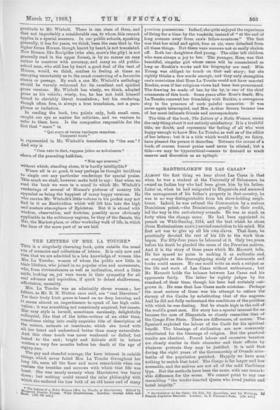BARTHOLOMEW DE LAS CASAS. , ALMOST the first thing we bear
about. Las Caeas is that when he was a student at the University of Salamanca he owned an Indian boy who had been given him by his father, Later on, when he had emigrated to Hispaniola and assumed the management of his father's property in that country, he was in no way distinguishable from his slave-holding neigh- bours. Indeed, he was refused the Communion by a zealous. Dominican priest,—the Dominicans, greatly to their credit, led the way in the anti-slavery crusade. He was as much as forty when the change came. He had been appointed to preach on Whit-Sunday, 1514, and the text which he chose (from Ecclesiastious xixiv.) carried conviction to his mind. His first act was to' give up all his own slaves. That done, lie practically devoted the rest of his ,life to the work thus begun. For fifty-four years he laboured at it. Only two years before his death he pleaded the cause of the Peruvian natives. And it is the story of these years which Mr. Macnutt tells, He has spared no pains in making it as authentic • and as complete as the thoroughgoing study of documents and books could ensure. No one could write on such a subjeot as the life and work of Las Cases without enthusiasm; but Mr. Me cnutt holds the balance between Las Cases and his opponents fairly. The latter be rightly judges by the standard of their time, though his hero had certainly out • grown it. He sees that Las Cases made mistakes: Perhaps . the most serious of these was his attempt to relieve the. slavery of the Caribs by substituting that of the negroee. And he did not fully understand the conditions of the problem with will& he was dealing. But he stands high in the roll of the world's great men. His story has a special interest for us because the case of Hispaniola so closely resembles that of the Congo Free State. There are differences, of course; The • Spaniard exploited the labour of the Carib for his spiritual benefit. The blessings of civilisation are now commonly substituted for the blessings of religion. But the practical results. are identical.. Forced labour and excessive taxation. are closely similar in their character and their effects by Whatever pretexts they may be justified. It is said that auring the eight years of the Governorship of Ovando nine- , tenths of the. population perished. Happily we have seen nothing to match that total. The Congo is far latger and less' accessible, and the natives are not all of the mild Caribbean type. But the methods have been the same, with one remark. able difference for the worse. We cannot point to any one resembling "the tender-hearted Queen who loved justice and hated iniquity."
* Bartholomew de Ins. Came: hie Life, his Apoetolate, and his Writing/3,, TV Francis Augustus Maunutt, London G. P. Putnam', Sons. [158. net.]










































 Previous page
Previous page